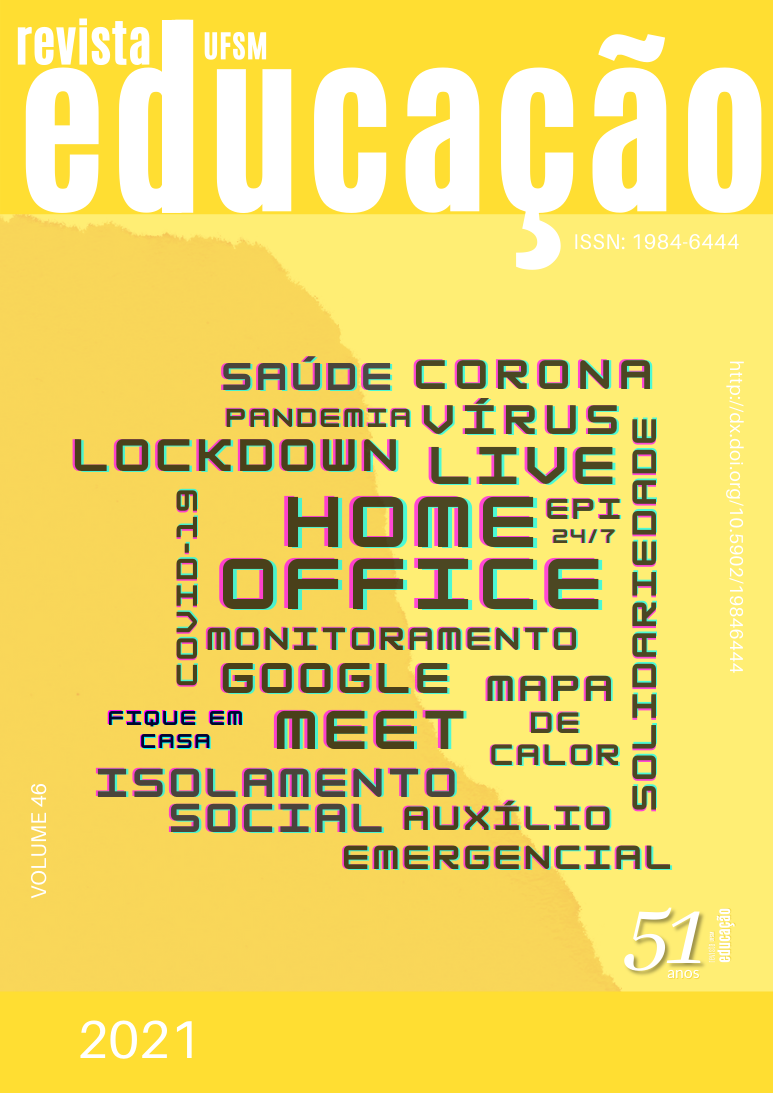The art of disappearance as a groping thought experiment: contributions to educational research
DOI:
https://doi.org/10.5902/1984644444292Keywords:
Disappearance, Essay, Educational ResearcheAbstract
This article aims to discuss the so-called essayistic form of thinking and its impact for the field of educational research. From the triangulation of forces between the thinking of Michel de Montaigne, Enrique Vila Matas and Gilles Deleuze-Felix Guattari, the study explores how, in the dawn of modern subjectivity, a certain art of portraiture produced from the essayistic form developed by Montaigne, produces a groping mode of thought experimentation whose horizon turns to a condition of disappearance. This work aims to study this distinctive portrait art dedicated to disappearance, focusing on its fabulous power, as well as explore its resonances in the ways we conceive the researcher's craft, especially in the educational field, as opposed to another portrait art called cartesian and developed by René Descartes. The discussion points out that the disappearance, by establishing another geography of thought, enables the educational researcher to mobilize other procedures in order to research the unthinkable.
References
BARROS, Laura Pozzana de; KASTRUP, Virgínia. “Cartografar é acompanhar processos”. In: PASSOS, Eduardo; KASTRUP, Virgínia; ESCÓSSIA, Lilliana (orgs.). Pistas do Método da Cartografia: pesquisa-intervenção e produção de subjetividade. Porto Alegre: Sulina, 2012. p. 52-75.
BARROS, Laura Pozzana; PASSOS, Eduardo. “Por uma política da narratividade”. In: PASSOS, Eduardo; KASTRUP, Virgínia; ESCÓSSIA, Lilliana (orgs.). Pistas do Método da Cartografia: pesquisa-intervenção e produção de subjetividade. Porto Alegre: Sulina, 2012. p. 172-205.
COSTA, Gilcilene Dias da. “Curricularte: experimentações pós-críticas em educação”. Educação & Realidade, Porto Alegre, v. 36, n. 1, jan-abr. 2011, p. 279-293. Disponível em: https://seer.ufrgs.br/educacaoerealidade/article/view/11554/11577. Último acesso em: 02 de janeiro de 2019.
DELEUZE, Gilles. Cinema 2: a imagem-tempo. Tradução de Eloisa de Araújo Ribeiro. São Paulo: Brasiliense, 2007b.
DELEUZE, Gilles. Crítica e Clínica. Tradução Peter Pál Pelbart. São Paulo: Editora 34, 1997.
DELEUZE, Gilles. Diferença e Repetição. Trad. Luiz B. Orlandi e Roberto Machado. São Paulo: Graal, 1988.
DELEUZE, Gilles. Francis Bacon: lógica da sensação. Tradução de Roberto Machado (coord.). Rio de Janeiro: Jorge Zahar Editores, 2007a.
DELEUZE, Gilles. Nietzsche e a filosofia. Tradução: Edmundo Fernandes Dias e Ruth Jofflily Dias. Rio de Janeiro: Editora Rio, 1976.
DELEUZE, Gilles. Proust e os signos. Tradução de Antônio Carlos Piquet e Roberto Machado. Rio de Janeiro: Forense Universitária, 2010.
DELEUZE, Gilles; GUATTARI, Félix. Mil Platôs: capitalismo & esquizofrenia, vol. 1. Trad. Aurélio Guerra Neto e Célia Pinto Costa. São Paulo: Editora 34, 1995.
DELEUZE, Gilles; GUATTARI, Félix. O que é a Filosofia? Trad. Bento Prado Jr. e Alberto Alonso Muñoz. São Paulo: Editora 34, 1992.
DESCARTES, René. Discurso do Método. Trad. Maria Ermantina de Almeida Prado Galvão. São Paulo: Martins Fontes, 2009.
DESCARTES, René. Meditações Metafísicas. Trad. Maria Ermantina de Almeida Prado Galvão. São Paulo: Martins Fontes, 2011.
ESCÓSSIA, Liliana de; TEDESCO, Silvia. “O coletivo de forças como plano de experiência cartográfica”. In: PASSOS, Eduardo; KASTRUP, Virgínia; ESCÓSSIA, Lilliana (orgs.). Pistas do Método da Cartografia: pesquisa-intervenção e produção de subjetividade. Porto Alegre: Sulina, 2012. p. 92-108.
FERRAÇO, Carlos Eduardo. “Pesquisa com o cotidiano”. Educação & Sociedade, Campinas, vol. 28, n. 98, jan-abr. 2007, p. 73-95. Disponível em: http://www.scielo.br/pdf/es/v28n98/a05v2898.pdf. Último acesso em: 02 de janeiro de 2019.
FOUCAULT, Michel. As Palavras e as Coisas. Trad. Salma Tannus Muchail. São Paulo: Martins Fontes, 2009.
FOUCAULT, Michel. História da Loucura na idade clássica. Trad. José Teixeira Coelho Netto. São Paulo: Perspectiva, 1978.
MONTAIGNE, Michel de. Os Ensaios: livro I. Trad. Rosemary Costhek Abílio. São Paulo: Martins Fontes, 2002.
OLIVEIRA, Ranniery Moreira de; PARAÍSO, Marlucy Alves. “Mapas, dança, desenhos: a cartografia como método de pesquisa em educação”. Pro-Posições, Campinas, v. 23, n.3, set-dez. 2012, p. 159-178. Disponível em: http://www.scielo.br/pdf/pp/v23n3/10.pdf. Último acesso em: 02 de janeiro de 2019.
PRESTES, Nadja Hermann. “Metafísica da subjetividade na educação: as dificuldades do desvencilhamento”. Educação & Realidade, Porto Alegre, v. 22, n. 1, jan-jun. 1997, p. 81-94. Disponível em: https://seer.ufrgs.br/educacaoerealidade/article/view/71465/40541. Último acesso em: 02 de janeiro de 2019.
RIBEIRO, Cintya Regina. “‘Pensamento do fora’, conhecimento e pensamento em educação: conversações com Michel Foucault”. Educação & Pesquisa, São Paulo, v. 37, n. 3, jul-set. 2011, p. 613-628.
ROUSSEL, Raymond. Como Escrevi Alguns dos meus Livros. Trad. Fabiano Viana. Florianópolis: Cultura e Barbárie, 2015.
VILA-MATAS, Enrique. Doutor Pasavento. Trad. José Geraldo Couto. São Paulo: Cosac Naify, 2009.
VILA-MATAS, Enrique. O Mal de Montano. Trad. Celso Mauro Paciornik. São Paulo: Cosac Naify, 2005.
VILA-MATAS, Enrique. Perder Teorías. Madrid: Seix Barral, 2010.
VINCI, Christian F. R. G. Lenta Voragem: experimentação e prudência na pesquisa educacional deleuzo-guattariana. Tese de Doutorado. São Paulo: Universidade de São Paulo, 2019.
VINCI, Christian F.R.G.; RIBEIRO, Cintya R. Experimentações com a Pesquisa Educacional Deleuze-Guattariana no Brasil. Educação & Realidade, Porto Alegre, v. 43, n. 1, p. 23-44, mar. 2018. Disponível em http://www.scielo.br/scielo.php?script=sci_arttext&pid=S2175-62362018000100023&lng=pt&nrm=iso. Último acesso em: 14 de dezembro de 2019.
Published
How to Cite
Issue
Section
License
Declaration of originality
We declare that all articles present in the journal Educação (UFSM) are originals and were not submitted for publishing on any other publication, as a whole or a fraction. We also declare that, after being published by Educação (UFSM), a paper will not be submitted to another journal within two years. After this time, our journal transfers the publishing rights to the authors, with a permit granted by the Editorial Council.
We also acknowledge that the originals’ submission to Educação (UFSM) implies on a transference of copyright for physical and digital publishing to the journal. In case of noncompliance, the violator will receive sanctions and penalties predicted by the Brazilian Copyright Protection Law (n. 9610, dated 19/02/98).
Attribution 4.0 International (CC BY 4.0)
This license lets others remix, transform, and build upon the material for any purpose, even commercially, and copy and redistribute the material in any medium or format.

This work is licensed under a Creative Commons Attribution 4.0 International (CC BY 4.0)






